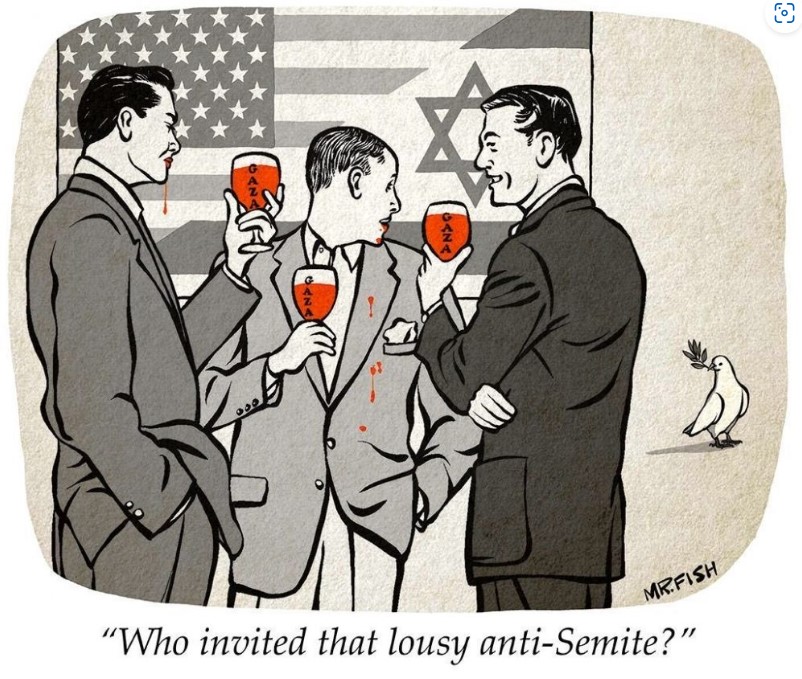Antisemitic cartoons drawn by a lecturer at the University of Pennsylvania have re-opened the debate over the Ivy League school’s reputation as an enclave of anti-Jewish hate.
“Penn Lecturer Is Behind Grotesque Anti-Semitic Cartoons” is the headline at the Washington Free Beacon, which links to the work of Dwayne Booth. According to the news site, Booth “joined Penn’s Annenberg School for Communication as an adjunct faculty member in 2015 and teaches two classes at the Ivy League institution, publishes political cartoons under the pen name ‘Mr. Fish.'”
Booth’s work includes antisemitic tropes such as Zionists drinking the blood of Gazans, and a Nazi flag featuring the Star of David.

“Dwayne Booth’s cartoon dangerously invokes the classic antisemitic propaganda of the blood libel,” said Michael Balaban, president and CEO of the Jewish Federation of Greater Philadelphia. “At a time when antisemitism is on the rise across the country, these cartoons only serve to demonize and isolate the Jewish community, minimizing the legitimate threat of antisemitism. We call on the University of Pennsylvania to address Booth’s tenure to show that perpetuating antisemitic tropes should never be tolerated.”
Eyal Yakoby, a senior majoring in political science and modern Middle East studies, said, “Penn’s ambivalence has emboldened bad actors to behave however they please. The prevailing atmosphere at Penn is inhospitable. This is directly influenced by employees of the university or agents of the university, such as this lecturer. These ‘educators,’ if you can call them that, prove to the rest of the community that they can act with impunity, no matter how vile or unlawful their actions are, resulting in a climate where anyone feels unrestricted in their actions.”
Yakoby, one of the Jewish students suing Penn, added, “Stories like this should show how (the lawsuit) is even more necessary now than ever. It was not only [former UPenn President Liz] Magill. It is a systemic problem at Penn.”
Magill was forced to resign after her widely-criticized testimony before Congress during a hearing on rising antisemitism on U.S. college campuses. She was unable to answer whether calling for “the genocide of Jews” was a violation of Penn’s policies covering campus speech.
A group of wealthy donors also announced publicly that they would no longer support the university, and alums also issued scathing condemnations.
Jewish students who were subjected to harassment and antisemitism on campus filed a lawsuit demanding their tuition be refunded. The issues began before the Oct. 7 terror attack by Hamas against Israel when Penn hosted a Palestinian Writes Literature festival that featured noted antisemites like Roger Waters and Marc Lamont Hill, who was fired from CNN for using the phrase “free Palestine from the river to the sea,” which equates with the destruction of Israel and all who live there. The festival was held just before Yom Kippur, the holiest day on the Jewish calendar.
The federal Department of Education filed and then dropped a civil rights complaint against the Ivy League school, saying the charges were the same as those in the students’ lawsuit.
Penn Interim President J. Larry issued a statement: “I will not, and should not, respond to every event on our campus, but I want it understood that these political cartoons, posted on a personal website, were not taught in the classroom and do not reflect the views of the University of Pennsylvania or me, personally. I find them reprehensible, with antisemitic symbols, and incongruent with our efforts to fight hate. They disrespect the feelings and experiences of many people in our community and around the world, particularly those only a generation removed from the Holocaust. And, for me, it is painful to see the suffering and tragic loss of life of noncombatants in Israel and Gaza be fodder for satire.
At Penn, we have a bedrock commitment to open expression and academic freedom, principles that were unanimously reaffirmed last week by our Faculty Senate Executive Committee. We also have a responsibility to challenge what we find offensive, and to do so acknowledging the right and ability of members of our community to express their views, however loathsome we find them.”

